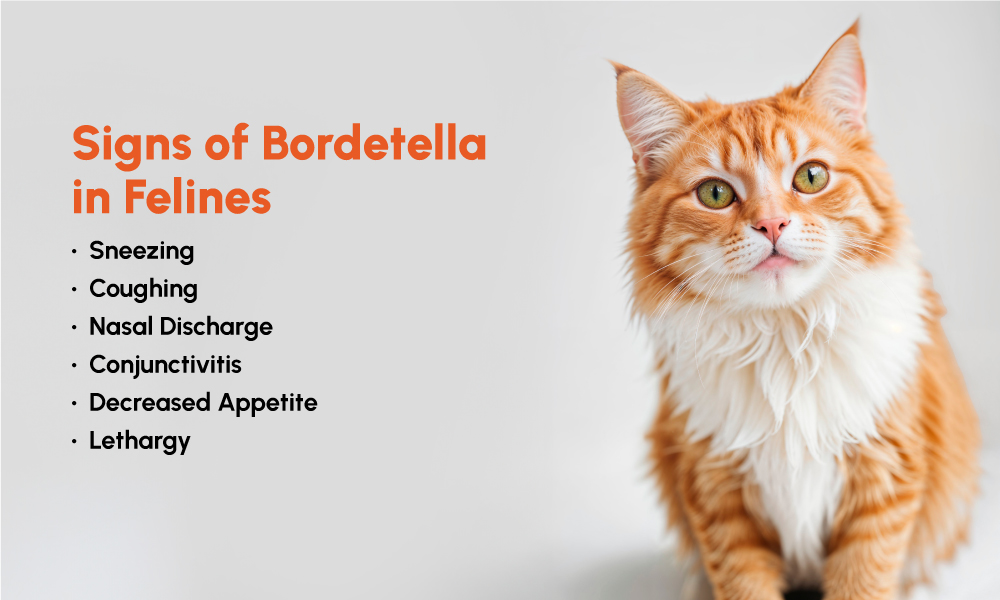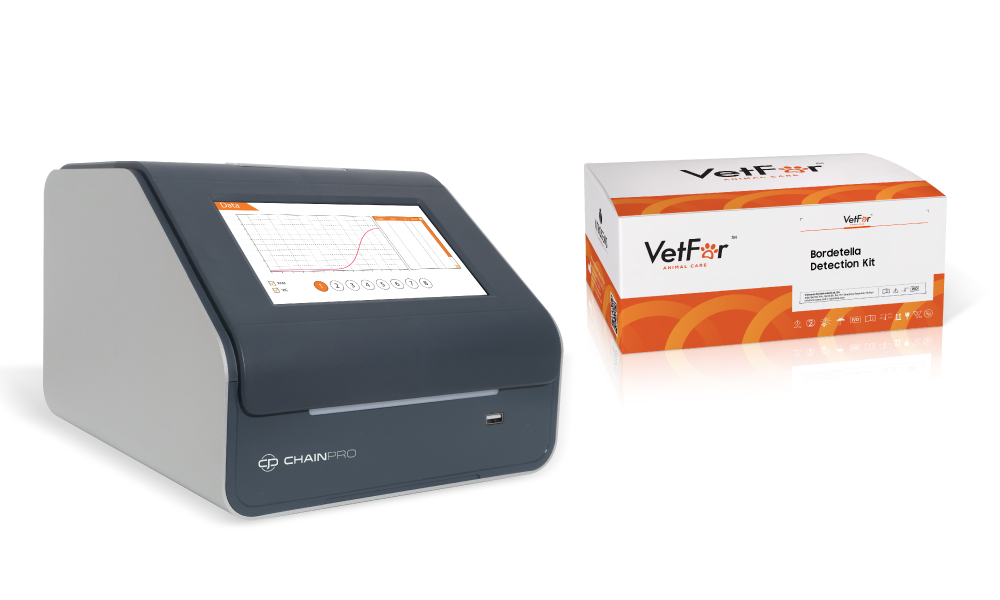Canine and feline health are often challenged by various respiratory infections, among which Bordetella plays a significant role. This bacterium, commonly associated with kennel cough in dogs and respiratory disease in cats, can spread swiftly in environments where animals congregate, like kennels or shelters.
To effectively manage and prevent the spread of Bordetella, reliable diagnostic tools are crucial. One such tool is the VetFor Bordetella Detection Kit, designed to swiftly and accurately detect Bordetella antigens. This kit not only aids in early identification but also enables prompt treatment and containment measures, essential for mitigating the transmission of kennel cough and related infections.
Continue reading to understand how proactive detection with the VetFor Bordetella Detection Kit can safeguard your pets and foster a healthier environment for all.

Understanding Bordetella: A Common Respiratory Threat
Bordetella poses a significant respiratory threat to both dogs and cats. This bacterium, responsible for kennel cough in dogs and respiratory infections in cats, spreads easily in environments where animals congregate, such as shelters and multi-pet households.
In dogs, Bordetella bronchiseptica is the primary cause of kennel cough, characterized by a persistent dry cough, nasal discharge, and occasional fever. Cats can also be affected by Bordetella species, though less frequently, presenting with symptoms like coughing, sneezing, and nasal discharge.
Preventing Bordetella infections involves understanding its transmission pathways and recognizing early symptoms. Vaccination plays a crucial role, especially in high-risk environments. Maintaining good hygiene practices and minimizing stress can also help reduce the likelihood of infection.
Stay tuned as we explore effective prevention strategies to protect our pets’ health. We’ll discuss practical steps you can take to safeguard them against Bordetella infections without delving into specific diagnostic tools.
What Is Bordetella In Canines?
Bordetella is a bacterial pathogen closely linked to canine respiratory diseases, notably kennel cough. Kennel cough, or Canine Infectious Respiratory Disease (CIRD), is a collective term encompassing various respiratory infections in dogs. While many people use “Bordetella” interchangeably with “kennel cough,” it’s important to understand that kennel cough can also result from viral infections like canine influenza. However, Bordetella bronchiseptica remains a primary bacterial culprit in these cases.
Bordetella is highly contagious and spreads through direct contact with infected dogs or contaminated objects. The bacteria can be transmitted via droplets in the air, direct physical contact, and contaminated surfaces such as shared toys or water bowls. Places like doggy daycares, groomers, dog parks, boarding facilities, and shelters are common environments where dogs can contract Bordetella. However, any dog can be at risk because Bordetella can survive in the environment for weeks and on objects for several days.
Infection with Bordetella leads to inflammation of the respiratory system, resulting in symptoms such as persistent coughing and lethargy. These symptoms can weaken the immune system, making dogs more vulnerable to secondary infections, including pneumonia.
Signs of Bordetella Infection in Canines
Understanding Bordetella infection in dogs begins with recognizing its primary symptom: kennel cough. Kennel cough is an umbrella term for various respiratory illnesses, where Bordetella bronchiseptica is a common culprit. Symptoms of Bordetella in dogs include:
- Dry, honking cough: The hallmark symptom of Bordetella is a dry, honking cough, often associated with kennel environments.
- Runny nose and sneezing: Dogs may exhibit nasal discharge and sneezing due to airway inflammation.
- Fever: A fever indicates the body’s response to infection. Monitoring fever levels is crucial to gauge the effectiveness of treatment.
- Loss of appetite: Dogs with Bordetella may experience reduced appetite due to illness. Consult your vet if your dog refuses food entirely.
- Lethargy: Due to the body focusing on fighting infection, dogs may appear more tired than usual. Severe lethargy warrants immediate veterinary attention.
While recognizing these signs can guide you in seeking veterinary care, it’s important not to attempt home diagnosis or treatment. Similar symptoms can indicate more serious conditions like pneumonia, requiring professional evaluation.
Most cases of Bordetella in dogs resolve within a few weeks with supportive care. Treatment, if necessary, aims to alleviate symptoms and speed recovery. Always consult your vet for proper diagnosis and treatment recommendations to ensure your dog’s health and well-being.

What Is Bordetella In Felines?
Bordetella in felines, caused primarily by Bordetella bronchiseptica and occasionally Bordetella hinzii, is a bacterial infection affecting cats’ respiratory systems. Similar to dogs, this condition can lead to respiratory symptoms and is commonly found in environments where cats are housed closely together, such as shelters or multi-cat households.
Symptoms of Bordetella infection in cats include sneezing, coughing, and nasal discharge, reflecting the bacterial inflammation of their respiratory tracts. The transmission occurs through direct contact with infected cats or contaminated objects, making kittens and older cats with compromised immune systems particularly susceptible to severe symptoms.
Diagnosis involves clinical evaluation and may include laboratory tests to confirm Bordetella bacteria. Treatment typically includes antibiotics to combat the infection, alongside supportive care to manage symptoms like nasal discharge and coughing. Veterinary guidance is crucial to ensure effective treatment and monitoring, especially to prevent complications such as pneumonia.
Understanding Bordetella in felines is essential for both pet owners and veterinarians to promptly recognize and manage respiratory infections, thereby safeguarding cats’ health in various environments.
Signs of Bordetella Infection in Felines
Bordetella infection in cats, primarily caused by Bordetella bronchiseptica and occasionally Bordetella hinzii, manifests through several distinct symptoms:
- Sneezing: Cats may experience frequent and sudden sneezing episodes, often due to irritation in the respiratory tract caused by the infection.
- Coughing: Similar to dogs, infected cats may develop a dry, persistent cough that can worsen over time.
- Nasal Discharge: Clear or mucous-like discharge from the nose is common, indicating inflammation of the nasal passages.
- Conjunctivitis: Some infected cats may exhibit signs of conjunctivitis, including redness, swelling, or discharge from the eyes, often due to secondary bacterial infections.
- Decreased Appetite: Bordetella-infected cats may show reduced interest in food, potentially leading to weight loss if not addressed promptly.
- Lethargy: Affected cats may appear more lethargic than usual, sleeping more frequently and showing less interest in their surroundings.
Recognizing these signs early and seeking veterinary care promptly is essential for effectively managing Bordetella infections in cats and preventing potential complications.

Diagnosing Bordetella In Canines and Felines
Diagnosing Bordetella infections in both canines and felines is crucial for the effective management and treatment of these respiratory diseases. Bordetella bronchiseptica is a primary pathogen responsible for kennel cough in dogs and can cause respiratory illness in cats as well. Accurate diagnosis is essential to ensure appropriate treatment and to prevent the spread of this highly contagious bacterium.
Understanding the Importance of Accurate Diagnosis:
Bordetella infections present with symptoms such as coughing, sneezing, nasal discharge, and lethargy in both dogs and cats. These symptoms, however, can overlap with other respiratory infections and illnesses, making accurate diagnosis challenging but vital. Early and precise identification of Bordetella allows for targeted treatment and helps in taking necessary precautions to prevent outbreaks, especially in environments like shelters, kennels, and multi-pet households.
Traditional Diagnostic Methods:
Traditionally, diagnosing Bordetella involves a combination of clinical examination and laboratory testing. Veterinarians often start with a physical examination, noting symptoms and the pet’s medical history. Nasal or throat swabs are commonly collected for bacterial culture, which involves growing the bacteria in a lab to identify Bordetella. While culture methods are reliable, they can be time-consuming, often taking several days to yield results.
Introducing the VetFor Bordetella Detection Kit – PCR:
The VetFor Bordetella Detection Kit is a groundbreaking tool designed to enhance the speed and accuracy of diagnosing Bordetella infections in both canines and felines. This kit employs Polymerase Chain Reaction (PCR) technology, a highly sensitive and specific method for detecting the genetic material of Bordetella bacteria.

Advantages of the VetFor Bordetella Detection Kit:
- Rapid Results: Unlike traditional culture methods, the VetFor Bordetella Detection Kit can provide results within hours. This rapid turnaround time is crucial for timely decision-making and treatment initiation.
- High Sensitivity and Specificity: PCR technology amplifies the DNA of Bordetella bacteria, making it possible to detect even small quantities of the pathogen. This ensures that infections are not missed and that false negatives are minimized.
- Ease of Use: The kit is designed for ease of use in veterinary settings. Samples can be collected through nasal or throat swabs, which are then processed using the PCR kit. The straightforward protocol allows for quick and efficient testing.
- Versatility: The VetFor Bordetella Detection Kit is effective for both dogs and cats, making it a versatile tool for veterinary practices that cater to multiple species.
- Preventive Measures: Early and accurate detection of Bordetella enables veterinarians to implement preventive measures swiftly. This includes isolating infected animals, advising on appropriate vaccinations, and informing pet owners about steps to reduce the spread of the infection.
Conclusion:
The VetFor Bordetella Detection Kit represents a significant advancement in the diagnosis of Bordetella infections in canines and felines. By leveraging PCR technology, this kit offers rapid, accurate, and reliable results, aiding veterinarians in providing timely and effective care for affected pets. Early detection and precise diagnosis are key to managing Bordetella infections, preventing outbreaks, and ensuring the health and well-being of our furry companions. With tools like the VetFor Bordetella Detection Kit, veterinary practices can enhance their diagnostic capabilities and improve outcomes for pets suffering from respiratory illnesses. For detailed information, please contact info@webdemo102.tech.
